
| |
Volume 3, Number 72 |
|
"There's a Jewish story everywhere" |
|
Today's Postings:
Friday-Saturday, March 27-28, 2009
{Click on a link to jump to the corresponding story. Or, you may scroll leisurely through our report}
|
INTERNATIONAL
The bricks and mortar of Netanyahu's coalition ... by Ira Sharkansky in Jerusalem
JERUSALEM—The election occurred on February 10th and the results were known on the 11th. Remember that Likud won fewer seats than Kadima, but the president as well as much of the population concluded that Likud would have a better chance of putting together a coalition that would get the support of a Knesset majority.READ MORE
Far too much sacrificed to form Netanyahu's government ... by Rabbi Dow Marmur in Jerusalem
The new government of Israel to be announced early next week is the outcome of many sacrifices. (1) Ehud Barak has sacrificed not only whatever integrity the party that he leads may have had, but also its unity... READ MORE
JUDAISM
Rabbi Salkin, tall teller of tales, shares wit at Emanu-El ... by Sara Appel-Lennon in San Diego
SAN DIEGO—Rabbi Jeffrey Salkin spoke in San Diego at the Robert M. Gardner Memorial Scholar-in Residence week-end. He is Executive Director and Rabbi of Kol Echad; Making Judaism Matter. It is a transdenominational adult learning center in Atlanta, Georgia, where Jews and others study Judaism to respond to life’s deeper questions.READ MORE
ARTS/ LEISURE
Groucho thought him the wickedest wit of the West ... by Cynthia Citron in Pacific Palisades, California
PACIFIC PALISADES, California- Humorist, playwright, and screenwriter S. J. Perelman and the irrepressible Groucho Marx were once asked who they considered the quickest wits alive---the men who were fastest with hilarious impromptu one-liners. Without a moment’s hesitation, the two agreed: “George S. Kaufman, Oscar Levant, and Irving Brecher.”READ MORE
Zina Schiff concert combined artistry with music history ... by David Amos in La Jolla, California
Guaranteed. Whenever you see an announcement of a performance by violinist Zina Schiff, be prepared for a musical treat. And this is exactly what took place at the La Jolla JCC in a recital which was part of the Tenth Annual San Diego Jewish Music Festival, on March 23. READ MORE
The safety in that 'cocoon of light and sound' on stage ... by Laurel Corona in La Jolla, CaliforniaZina Schiff and her accompanist, Mary Barranger, were somewhere in the wings the evening of March 23 when Roselyn Pappelbaum, the director of the San Diego Jewish Music Festival, greeted the Garfield Theatre audience at the opening concert of the festival’s tenth season. I couldn’t see Zina, but it was easy to picture her. READ MORE
ADVENTURES IN SAN DIEGO JEWISH HISTORYNovember 28, 1952; Southwestern Jewish Press
Tifereth Israel Sisterhood READ MORE
Jewish Center News READ MORE
Slayen Made Major READ MORE
Council of Jewish Women READ MORE
Cottage of Israel READ MORE
Lasker Lodge B.B. READ MORE
Go to top of right column
|
|
JEWISH INTERNET FAVORITES
We continue our examination of Jewish entertainers
Ed Ames tosses a tomahawk on the Johnny Carson Show-- wait for the punchline! VIEW VIDEO
Keenan Wynn in "Around the World" with David McCallum and Lloyd Bridges VIEW VIDEO
Sam Wanamaker as father of Goldie Hawn in "Private Benjamin" VIEW VIDEO
Wayne and Shuster in "City Golf"VIEW VIDEO
COMMUNITY WATCH/ ADVERTISERS NEWS
Carol Ann Goldstein: Change web content to attract readersREAD MORE
Soille San Diego Hebrew Day School: Soille Hebrew Day’s Third Graders Visit Old Town READ MORE
TODAY'S ADVERTISERS
A&B Gefilte Fish see coupon
America's Vacation Center
Anti-Defamation League
Balloon Utopia
Carol Ann Goldstein
Congregation Beth Israel
Jewish Community Foundation
Jewish Family Service
Lawrence Family JCC
San Diego Community Colleges
San Diego Jewish Academy
San Diego Jewish Chamber
Seacrest Village Retirement Communities
Soille San Diego Hebrew Day School
Tifereth Israel Synagogue
United Jewish Federation
XLNC-1 Radio
DEDICATIONS
Each day's issue may be dedicated by readers—or by the publisher—in other people's honor or memory. To see today's dedications, please click here. Past dedications may be found at the bottom of the index for the "Adventures in San Diego Jewish History" page.
NOTE
PLEASE HELP US POLICE THIS SITE: If you see anything on this site that obviously is not in keeping with our mission of providing Jewish news and commentary, please message us at editor@sandiegojewishworld.com, so that we can fix the probem. Unfortunately, large sites like ours can be subjected to tampering by outsiders. Thank you!
EMAIL HEADLINE SERVICE
|
|
|



LETTER FROM JERUSALEM
The bricks and mortar of Netanyahu's coalition
|
By Ira Sharkansky
 JERUSALEM—The election occurred on February 10th and the results were known on the 11th. JERUSALEM—The election occurred on February 10th and the results were known on the 11th.
Remember that Likud won fewer seats than Kadima, but the president as well as much of the population concluded that Likud would have a better chance of putting together a coalition that would get the support of a Knesset majority. So far, agreements have been reached with Israel Beitenu, Labor, SHAS, and Jewish Home. Together with Likud, they amount to 69 seats, a clear majority in the 120 seat Knesset. Negotiations continue with Torah Judaism and National Unity.
Some Labor Members of Knesset (MKs) may be angry enough with party leader Ehud Barak for joining with Netanyahu that they will not support the coalition. Some members of Likud may be angry enough with Bibi for giving away prized appointments that their support will be tepid. Individual Likud MKs may work subtly or not so subtly to undermine Bib in the hopes of producing an early election.
Coalition arithmetic begins with the number of Knesset seats held by each potential partner, and the goodies that the prime minister designate can trade for support. Prominent among these are positions as ministers and chairs of Knesset committee, commitments for expenditures on favored items, and support for other policy issues.
The election results produced the following array of likely coalition partners:
Likud: 27 seats; Israel Beitenu: 15; Labor: 13, SHAS: 11, Torah Judaism: 5, National Unity: 4, Jewish Home: 3
It is conventional to rank the ministries by prestige. There is some dispute at the margins, but the rankings look more or less like the following. (The modest rankings of Health and Education reflect the importance of the Finance Ministry in setting expenditures, salaries, and service levels, the weight of Health Maintenance Organizations and teachers’ unions, and the autonomy of higher education.)
There are opportunities for dividing ministries to produce even more appointments, and to appoint deputy ministers and ministers without portfolio with vague or non-existent responsibilities.
The ministries likely to exist in Netanyahu's government, clustered by levels of prestige, are:
Group I—Prime Minister; Defense; Finance,Foreign Affairs
Group II—Justice; Interior; Industry and Trade; Public Security; Transportation; Construction and Housing
Group III—Education; Health; Communications; Agriculture
Group IV—Labor; Welfare; Immigrant Absorption; Infrastructure; Culture; Tourism; Science; Environmental Protection; Religions; Minorities; Development of the Negev and Galilee; Minister in the Office of the Prime Minister (This is an extra, which may carry few if any significant duties.)
It has become conventional to appoint a Deputy Prime Minister. The title of Deputy Prime Minister carries prestige, and few if any duties, except to act as the prime minister when the prime minister is out of the country or otherwise indisposed, and to assume the office upon death or resignation until the Knesset acts otherwise. The designation may come along with a ministerial appointment, or can be an extra if there aren’t enough ministries to meet the demand.
Bibi’s challenge was to win the support of several middle-sized or small parties, in order to reach a number of MKs as great as possible more than 60. Each potential partner knew its importance, and demanded appointments and other benefits.
Parties and ministries as of now, with summary prestige indications:
Labor party: Defense, Industry and Trade, Agriculture, Welfare, Minorities. (That is, 1 Group I; 1 Group II, 1 Group III, 2 Group IV)
Israel Beitenu: Foreign Affairs, Domestic Security, Infrastructure, Tourism, Immigrant Absorption. (1 Group I, 1 Group II, 3 Group IV)
SHAS: Interior, Construction and Housing, Religions. and minister in the prime minister’s office (2 Group II, 2 Group IV)
Jewish Home: Science (1 Group IV)
As of now, what is left for Likud, along with the position of prime minister is: Finance, Justice, Transportation, Education, Health, Communications, Tourism, Environmental Protection, Culture, Sport, Minorities, Development of the Negev and Galilee (2 Group I, 1 Group II, 3 Group III, 6 Group IV)
There are also appointments as heads of Knesset Committees. Here, too, there are differences in prestige, the leading ones being Foreign Affairs and Defense, Finance, Constitution Law and Justice, Knesset Committee, and State Audit. There are also sub-committees, some of which have greater prestige than full committees. There are traditions of appointing members of the opposition as chairs of certain committees. A prominent example is the Committee on States Audit, which focuses on the Office of the State Comptroller and its criticism of governmental bodies.
Beside ministerial appointments, the achievements of the coalition partners include:
Israel Beitenu received the chair of the Knesset Committee of Constitution Law and Judiciary, a representative on the committee to appoint judges, and a commitment to find a solution for the problem of marriages involving individuals not recognized as Jewish by the Rabbinate.
SHAS received a commitment to increase family allowances, i.e. monthly payments to families according to the number of children under the age of 18.
Labor received a period of rotation as chair of the Knesset Committee on Foreign Relations and Defense, and a commitment to increase old age pensions.
Go to top of right column
|
|
Jewish Home received a period of rotation as chairs of Knesset Committees of Education, and Children’s Rights
Promised increases in family allowances and old age pensions, if delivered, will be expensive. Agreements to both required Netanyahu to slip aside from his often touted claim as being the finance minister in an earlier government who saved the economy by reducing welfare entitlements. It will also crimp his current promise to reduce taxes, already in trouble due to a reduction in tax collections as a result of the economic recession. Clips of Netanyahu criticizing the Olmert government for the expense of 25 ministers and deputy ministers appear along with prospects that his government will have 33.
There is a rough equivalence between the number of appointments received by each party and the number of seats won in the election. What will complicate Netanyahu’s work among Likud members is the scarcity of key appointments left unfilled, and the number of Likud MKs who think themselves especially worthy. Some of these were recruited to Likud by Netanyahu shortly before the election, seemingly with indications that they would be important members of his government. Netanyahu may also want to keep for himself the most prized of the as yet unfilled positions: minister of finance.
The Likud MKs likely to be expecting prized appointments are:
—Silvan Shalom, prominent MK and former minister of Finance, and Foreign Affairs, and a rival of Netanyahu for party leadership
—Moshe Ayalon, former Commander of the IDF, and one of Bibi’s recruits to Likud’s list
—Benny Begin, son of the former prime minister, a politician in his own right, a former MK and minister, and one of Bibi’s recruits to Likud’s list
—Limor Levnat, prominent MK and former minister, and the highest ranking woman among Likud MKs
—Don Meridor, former minister of finance and justice, and one of Bibi’s recruits to Likud’s list
—Yosi Peled, retired general and prominent media commentator, and one of Bibi’s recruits to Likud’s list
—Miri Regev, one of Bibi’s recruits to Likud’s list, and a former spokeswoman of the IDF who came to prominence during the 2006 Lebanon war
—Ruby Rivlin former chair of the Knesset, destined for that position again
—Yuval Shteinitz prominent MK
—Gilad Ardon prominent MK
—Michael Eitan prominent MK
—Israel Katz prominent MK
—Gidon Saar prominent MK
Still hanging are Torah Judaism and National Unity. Together they would provide nine additional seats to the coalition, as well as problems. Torah Judaism would dig in its heels against provisions to ease the process of conversion to Judaism, and add to SHAS’s adamant posture against anything that facilitated the marriage of Jews to non-Jews, and even civil marriage for non-Jews. Israel Beitenu depends on the support of Russian speaking immigrants, where these items are high priority.
National unity might fit well with Israel Beitenu on political negotiations with Palestinians and the rights and responsibilities of Israel’s Arab citizens, but it would cause significant problems on these issues for Labor.
Bibi is likely to present his government for Knesset approval within a few days. Israeli law provides that it may serve a bit longer than four years. It has been a while since any government has served that long, and it is too early to bet on the life span of this one.
|
|
|
|
|

FROM THE SIDELINES
Far too much sacrificed to form Netanyahu's government
|
By Rabbi Dow Marmur
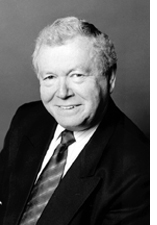 JERUSALEM—The new government of Israel to be announced early next week is the outcome of many sacrifices. (1) Ehud Barak has sacrificed not only whatever integrity the party that he leads may have had, but also its unity: many or most of the 13 Labor Knesset members may refuse to support him and the government he is about to join. JERUSALEM—The new government of Israel to be announced early next week is the outcome of many sacrifices. (1) Ehud Barak has sacrificed not only whatever integrity the party that he leads may have had, but also its unity: many or most of the 13 Labor Knesset members may refuse to support him and the government he is about to join.
(2) Binyamin Netanyahu, the prime minister in waiting, may have sacrificed the trust of many disgruntled Likud Knesset members who expected to become ministers but won’t, because Netanyahu had to bribe the other parties to join the coalition by giving them important portfolios.
(3) Netanyahu may also have sacrificed the good name of Israel in order to get Avigdor Lieberman into his government. The support Israel has had, not only in Europe but above all in the United States, may have been weakened as a result of making Lieberman Israel’s foreign minister. He’s probably among the least suitable representatives of the Jewish state on the international arena.
Marking the 30th anniversary of the peace between Israel and Egypt, spokespersons of the Egyptian government and Egyptian journalists have expressed grave misgivings about having to deal with Lieberman. Some have said that there are three sanctities in contemporary Egypt: the pyramids, the Aswan dam and President Mubarak. Lieberman has managed to insult two of them when he said some time ago that Israel may have to bomb the dam and that Mubarak can go to hell. The Egyptian-Israeli peace accord is vitally important to both countries and therefore it’ll continue, but the bruises inflicted by Lieberman won’t heal for a long time. And soon he may deliver others.
(4) But the greatest sacrifice of all Netanyahu has made is to the ultra-Orthodox (haredi) Shas party. Merav Arlozoroff, begins her column in today’s “The Marker,” the business section of “Ha’aretz,” with this sentence: “Two states for two peoples Binyamin Netanyahu may not be able to establish, but two states for one people he has established: the first is productive, Zionist and fighting; the second sapping the marrow of the first.”
The reference is to the concessions that Netanyahu has made to get Shas into the government. They include expensive handouts to families with many children – a haredi specialty – as well as more money for yeshivot, where young men ostensibly studying Torah to preserve Judaism live off the taxes paid by the productive citizens of the Zionist freedom loving state who also fight for the safety of the haredim.
The headline of her column paraphrases the famous saying by another Binyamin (the Hebraized name of the founder of modern Zionism: Binyamin Ze’ev – Theodor – Herzl) who’s quoted to have said, “In Basle I founded the Jewish state.” The “Marker” heading says, in the name of this Binyamin (Netanyahu): “In Jerusalem I founded the haredi state.”
Go to top of right column
|
|
With so many sacrifices it’s difficult not to fear (1) severe disruption in the Labor party, (2) rebellion in the ranks of Likud, (3) strictures by foreign government and, perhaps above all, (4) a battle between citizens of the Zionist state and inhabitants of its pious, prolific and parasitic counterpart.
I’m painfully conscious of once again bringing a less than cheerful message. As usual I hope that my pessimistic predictions will turn out to be entirely false.

.



|
|
|

SARA-N-DIPITY PLACE
Rabbi Salkin, tall teller of tales, shares wit at Emanu-El
|
By Sara Appel-Lennon
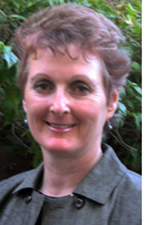 SAN DIEGO—Rabbi Jeffrey Salkin spoke in San Diego at the Robert M. Gardner Memorial Scholar-in Residence week-end. He is Executive Director and Rabbi of Kol Echad; Making Judaism Matter. It is a transdenominational adult learning center in Atlanta, Georgia, where Jews and others study Judaism to respond to life’s deeper questions. SAN DIEGO—Rabbi Jeffrey Salkin spoke in San Diego at the Robert M. Gardner Memorial Scholar-in Residence week-end. He is Executive Director and Rabbi of Kol Echad; Making Judaism Matter. It is a transdenominational adult learning center in Atlanta, Georgia, where Jews and others study Judaism to respond to life’s deeper questions.
When I asked Rabbi Salkin for three words to describe him, he mentioned: "creative, thoughtful, and humorous." I concur with him, and I was especially impressed with his weaving in humor to discuss difficult topics. Two words which came to my mind were " stamina" and "tall." I chose “stamina” because he often visits various temples nationwide whereby he gives a sermon on Friday. night, leads the Saturday morning Torah Study, and gives a speech both on Saturday night and Sunday morning. He claims that he has a rock star’s schedule, but taking his shoes off in airports gets tiresome.
I also chose “tall” because at six feet five inches he is taller than most of us. He also has great depth of knowledge about Judaism. The number of books he has written is a tall number. He has written his seventh book recently, Righteous Gentiles in the Hebrew Bible: Ancient Role Models for Sacred Relationships. He was honored with the Ben Franklin award for Putting God on the Guest List, Reclaim the Spiritual Meaning of Your Child’s Bar/Bat Mitzvah.
He also wrote a children's version of Putting God on Your Guest List. It was considered to be the best book of the year about religion. I admire that he was proactive by writing a book about this much needed topic. His other books include Dream of Zion: American Jews Reflect on Why Israel Matters to Them; Being God’s Partner: How to Find the Hidden Link between Spirituality and Your Work; and Business Bible:10 Commandments Bringing Spirituality and Ethical Values to the Workplace.
His education is tall as well. In 1981 he was ordained as a rabbi at Hebrew Union College-Jewish Institute of Religion in New York. In 1991 he was one of the first Jews to receive the Doctor of Ministry degree from Princeton Theological Seminary. He has been a rabbi in Florida, New York, Pennsylvania, and Georgia.
Rabbi Salkin spoke about Righteous Gentiles, the subject of his most recent book.
When I asked what prompted him to write this book, he stated that he loves the Bible so much and there are many sympathetic biblical characters that are not Jewish. Furthermore, he addresses the need for Jews to be kind to strangers since we were also strangers. He emphasizes that Jewish people live in an interdependent society; we do not live alone.
He recounted a touching story from his book. It was about an elderly woman named Anya, who lived with his boyhood friend, Ira, and his family. When he was a kid, and started asking questions, he asked his friend if the elderly woman was his grand-mother. Ira responded “No, she saved my mother during WWII.” In gratitude Ira’s mother invited Anya to live with her family. When the family decided to make Aliyah to Israel, Anya wanted to join them, despite the fact that Ira’s parents would have bought her a house of her own. When she died, she was rightfully buried in the same Catholic cemetery as Oskar Schindler. I appreciated the debt of gratitude that Ira’s mother felt toward Anya. I respected both Anya and Ira’s mother for acting upon their integrity.
Go to top of right column
|
|
To give you a taste of Rabbi Salkin’s well timed quick wit, I’ll share the following story with you; Rabbi Salkin was invited to be on a television talk show with a Palestinian. The Palestinian made the comment ‘The Israelis are stealing from the Palestinians just like I’m stealing your glasses.” He grabbed Rabbi Salkin’s glasses off his face. In the retelling of the incident, as Rabbi Salkin spoke to the congregation, especially the Kabbalah Torah class, he said “he was wondering if he could take this guy”. Rationale won over instinct since he looked at the Palestinian square in the eye and said “Sir, you’re making a spectacle of yourself.”
Everyone roared with laughter followed by the Palestinian
rightfully returning Rabbi Salkin’s glasses.
Rabbi Salkin taught that unfortunately anti-Semitism cannot be cured and that some people will have ill feelings toward Israel no matter who is in political power. He also stated that the problems in the Middle East would exist even if, God forbid, Israel did not. Rabbi Salkin advises us to stand up to anti-Semitism and respond to it.
To end on a positive note, I am reminded of a refrain from a Debbi Friedman song, “Not by might, not by power, but by freedom alone, may all men live in peace.” Like Rabbi Salkin, let’s respond with spirit and rationale so we may be the change we want to see.

|
|
|
|
|

L.A. BEAT
Groucho thought him the wickedest wit of the West
|
By Cynthia Citron
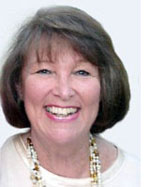 PACIFIC PALISADES, California- Humorist, playwright, and screenwriter S. J. Perelman and the irrepressible Groucho Marx were once asked who they considered the quickest wits alive---the men who were fastest with hilarious impromptu one-liners. Without a moment’s hesitation, the two agreed: “George S. Kaufman, Oscar Levant, and Irving Brecher.” PACIFIC PALISADES, California- Humorist, playwright, and screenwriter S. J. Perelman and the irrepressible Groucho Marx were once asked who they considered the quickest wits alive---the men who were fastest with hilarious impromptu one-liners. Without a moment’s hesitation, the two agreed: “George S. Kaufman, Oscar Levant, and Irving Brecher.”
Irving Brecher? Brecher, who died four months ago at the age of 94, began writing gag routines and one-liners for some of the country’s top entertainers during the golden age of vaudeville. By the age of 19 he was presenting himself, in an ad in Variety, as the writer of jokes “so bad that even Milton Berle wouldn’t steal them.” Which is what attracted Berle to hire Brecher to write jokes for him and move on with him to Hollywood.
By the time Brecher was 25 he was writing for the Marx Brothers and imitating his hero, Groucho, every chance he got. In fact, he once stood in for Groucho, eyebrows and moustache intact, in a photo shoot of the four brothers. No one noticed the substitution except Groucho’s daughter, who claimed that the ring Brecher was wearing was not one that belonged to her father.
The wit and wisdom of Irving Brecher is the subject of a hilarious new biography by Hank Rosenfeld, who met the Maestro eight years ago and stalked him until he agreed to collaborate with Rosenfeld on an “as told to” memoir. The book, published in January by Ben Yehuda Press, is titled The Wicked Wit of the West, an affectionate sobriquet given to Brecher by Groucho. That name, coincidentally, was even more appropriate than one might guess: Brecher was one of a number of uncredited writers brought in to help “punch up” the classic movie Wizard of Oz.
On a recent sunny Sunday, I was privileged to attend a house party to introduce Rosenfeld and his book to an enthusiastic audience of friends of Brecher. His elegant widow, Norma, was present to add personal tidbits to augment Rosenfeld’s remarks, and Rosenfeld played tapes from the seven years of interviews he conducted with Brecher during the writing of the book. The amazing discovery in listening to Brecher spin his yarns was to recognize how very much he sounded like Groucho in both his timing and the timbre of his voice. One can only guess whether it was mere coincidence or stems from the fact that Brecher is the only screenwriter who single-handedly wrote two Marx Brothers films: At the Circus and Go West.
In addition, Brecher wrote the screenplay for Meet Me in St. Louis and convinced Judy Garland to take the lead. Also among his credits was the popular radio and television series The Life of Riley, which included the character of kooky undertaker Digby O’Dell. Later, when The Life of Riley became a hit television show, it made a star of a new comic that Brecher hired to play Riley: Jackie Gleason. After Gleason had bamboozled him into paying for having his teeth capped, Gleason went on to television immortality. But there is a postscript to the story. Here it is, in Brecher’s own words:
“Apparently, Jackie was not embarrassed by anything. A few years later, I think it was ’55 or ’56, I’m at McCadden Studios in Hollywood, shooting an episode of another TV show I had thought up, called ‘Peoples Choice.’ This series starred an actor named Jackie Cooper and a dog named Cleo. My secretary’s name was Lois, and she stuck her head in my office.
‘There’s a long distance call. From Scottsdale, Arizona.’
‘Who’s it from?’
‘He wouldn’t say.’
‘Put him on.’
The voice was familiar. Millions heard it every week. Reginald Van Gleason, a character of Jackie’s.
‘Helloooooo dear pal. I’m smiling at you with your teeth!’
I had to laugh.
‘How are you, Jackie?’
‘Very rich.’
I knew that was true. We chatted warmly.
‘So why are you calling me?’ I asked finally. ‘You need another upper?’
Go to top of right column
|
|
Gleason got serious.
‘I bought a script for my next movie. It’s a comedy and I want you to direct it. The character is sort of a Chester Riley. His name is Gigot, a Frenchman. It’s funny.’
I told him I appreciated the offer.
‘Let me read it, and if I think I can do a good job, I’d be happy to do it.’
‘Great, pal. Away we go!’
He said he’d mail me the script right away.
I never heard from him again.”
But Brecher kept on working. In fact, there is hardly a famous entertainer, producer, director, or other Hollywood personality of his time whom he didn’t move to laughter. (He even performed as a standup comic at the Hillcrest Country Club at the age of 89.) The only people who don’t know all about him are most of the public at large. But NOW you do! And it'll give you a head start when you actually read Hank Rosenfeld's affectionate tribute to this very funny man, a mensch who called it as he saw it for the better part of a century.

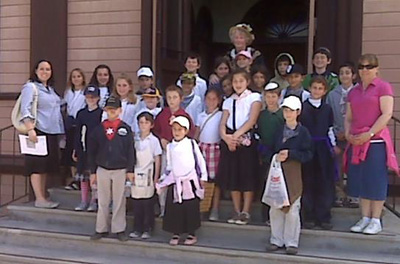
Soille Hebrew Day’s Third Graders Visit Old Town
|
|
|

MUSIC NOTES
Zina Schiff concert combined artistry with music history
|
By David Amos
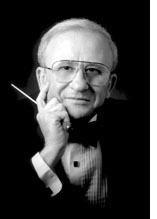 LA JOLLA, California — Guaranteed. Whenever you see an announcement of a performance by violinist Zina Schiff, be prepared for a musical treat. And this is exactly what took place at the La Jolla JCC in a recital which was part of the Tenth Annual San Diego Jewish Music Festival, on March 23. LA JOLLA, California — Guaranteed. Whenever you see an announcement of a performance by violinist Zina Schiff, be prepared for a musical treat. And this is exactly what took place at the La Jolla JCC in a recital which was part of the Tenth Annual San Diego Jewish Music Festival, on March 23.
But what made this evening very special, aside from the wonderful musicianship and sold-out audience, was that Zina Schiff preceded each musical selection with ample and useful explanations on the theme of the evening, music composed by many of the members of the Jewish Folk Music Society of Russia.
It all happened at the start of the Twentieth Century. Europe and Russia were brimming with interest, enthusiasm, and creativity for national music idioms. Nationalism, historic events, folk music, and liturgical music were celebrated through many concert works that are part of the standard repertory today.
This was especially true in Russia, and the celebrated Nicolai Rimsky-Korsakov, (a member of the “Russian Five” himself), encouraged many other musicians to express themselves by using the traditions of their ethnic origins.
His Jewish pupils were no exception. A small but talented group of composers were strongly encouraged by Rimsky-Korsakov. The group was mostly led by Yoel Engel; after the Bolshevik Revolution, they dispersed to various countries, but continued to pursue their “prime directive”.
Arkadie Kouguell moved to Beirut, where he continued teaching and composing. Others immigrated to Palestine, but most of them ended up in the United States, composing and performing.
Joseph Achron and Lazar Saminsky, together with other members of the Society, continued their work in the U.S., and enjoyed important careers in composition and performance. Achron’s brother, Isidor, became Heifetz’s preferred accompanist in the late 1930’s and early 40’s.
On a personal note, five years ago I had the pleasure to conduct the Royal Scottish National Orchestra with pianist Barry Goldsmith in a recording of two piano concertos by Isidor Achron, and a fantasy based on “Kol Nidre” by Saminsky.
Many performers emerged from this rich tradition of the Russian Jewish Music Society. Violinist and teacher Leopold Auer, who also worked at the St. Petersburg Conservatory, was the mentor of distinguished violinists whose names we all recognize: Jascha Heifetz, Nathan Milstein, Mischa Elman, and Efrem Zimbalist, just to name a few luminaries.
The March 23 program was a musical delight. Playing to a sold out house of a warm and receptive audience, (occasionally smitten with uncontrollable coughing), Zina Schiff, superbly accompanied by pianist Mary Barranger gave us a concise and focused overview of the Russian-Jewish tradition and its continuing legacy. The all-important communication between violinist and pianist was evident throughout the evening. All the works were accessible, communicative, and performed with impeccable taste and beauty.
It must be reiterated that Zina Schiff deserves ample credit for her consistent support and enthusiasm by promoting and performing music of the Russian Jewish School, through recitals, lectures, and highly acclaimed recordings.
The evening opened with The Mentor, Rimsky-Korsakov’s Hebrew Love Song. It was followed by Engel’s Chabad Melody and Freilachs. The music of violinist-teacher-composer Joseph Achron was heard in his Hebrew Melody, (popularized by Heifetz’s many recordings and encore selections), and the lesser performed Scher.
The first half was nicely rounded off with Kaddish by Kouguell and Saminsky’s Chassidic Suite.
Go to the top of next column
|
|
The second half of the recital provided us with the more substantial work of the evening, Aaron Copland’s Sonata for Violin and Piano. Although Copland was not directly related to the Russian Jewish School and his creative output does not quote Jewish sources, with one exception, his music displays the unmistakable stamp of his early Jewish and synagogue experiences. This sonata, composed in 1943, shows many of the sounds, sonorities, and harmonies that are found in his Third Symphony, which originated from the same time period.
Interestingly, our other giants of Twentieth Century American music treated Judaism in contrasting manners: Leonard Bernstein repeatedly composed on Jewish texts and concepts, while George Gershwin never did, although the latter’s music is brimming with his early-life influences.
The entertaining Folk Song Surprise! By Heifetz and Joel Engel’s Beggar’s Dance from “The Dybbuk” brought the recital to a satisfying conclusion. We were treated to an encore, Orientale, by Efrem Zimbalist, another pillar of this great musical tradition.
Aside from the points of historical interest of this program, and the nature of its audience-friendly musical selections, it must be emphasized that the wonderful musicianship displayed by Zina Schiff and Mary Barranger is what gave the recital its artistic relevance. It is a pleasure to hear and watch music which is being performed at such high level, while at the same time providing the listeners with a memorable experience.
|
|
|

|
By Laurel Corona
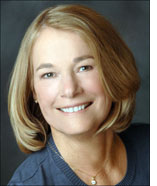 LA JOLLA, California—Zina Schiff and her accompanist, Mary Barranger, were somewhere in the wings the evening of March 23 when Roselyn Pappelbaum, the director of the San Diego Jewish Music Festival, greeted the Garfield Theatre audience at the opening concert of the festival’s tenth season. I couldn’t see Zina, but it was easy to picture her. LA JOLLA, California—Zina Schiff and her accompanist, Mary Barranger, were somewhere in the wings the evening of March 23 when Roselyn Pappelbaum, the director of the San Diego Jewish Music Festival, greeted the Garfield Theatre audience at the opening concert of the festival’s tenth season. I couldn’t see Zina, but it was easy to picture her.
She was standing calmly and quietly, her face aglow with the beatific smile that so often lights her face. She doesn’t get stage fright, she told me when I interviewed her a few days earlier. The auditorium full of people and their expectations aren’t what ‘s on her mind. She is ready to go out and be with her music.
“I’m always surprised when people think it is so daring to perform,” she says. She’s going grocery shopping with Mary after I interview her, and to Zina that is a far scarier proposition, not because she seems particularly timid or withdrawn, but because the world is an uncertain place. There’s safety in that cocoon of light and sound on stage that can’t be had anywhere else.
“It’s when I’m performing that I get to be most who I am,” she tells me, cradling her heart with smooth fingers that are at once delicate and strong. “It’s when I get to be the most Zina.”
Zina at her most is what we saw at Monday’s concert. The New York Times got it right when it called her playing “luscious and high voltage.“ The music was by turns sad, playful, adamant, weighty, and explosive. But whether the notes were as ethereal as a wisp of smoke from an extinguished candle, or as wild as a brush fire roaring up a slope, in Zina’s hands they were life, full and passionate.
Joseph Achron’s “Hebrew Melody” and “Scher,” were two highlights of the evening. “Hebrew Melody” was simple and declarative at the start, giving way to delicate fluttering, almost like chatter, at the end. With “Scher,” a grinning Zina danced. She’s having fun, I thought more than once, especially in the last piece of the concert, Josef Engel’s “Beggar’s Dance,” from The Dybbuk. Cradling her violin under her arm with the confidence of someone with a familiar third limb, she clapped, encouraging the audience to do the same. But fun is an odd thing, and it can even mean tears. After playing her mentor and teacher Jascha Heifetz’ beautiful interpretation of Stephen Foster’s “I Dream of Jeannie,” Zina told the audience it was rare not to be crying by the time she was halfway through.
Several times during the performance, Zina came to the podium to talk about the music. We learned that “Oriental” was a code word to disguise music influenced by Jewish folk
Go to top of right column
|
|
music. We heard that non-Jewish composer Nikolai Rimsky-Korsakov championed the beauty of Jewish folk melodies ,and we listened to an illustration of this in the “Hebrew Love Song,” opening the concert. We discovered that the quintessentially American composer Aaron Copland honored his Jewish roots with shades of a hora in the Sonata for Violin and Piano, which Zina played in the second half of the recital.
Pianist Mary Barranger accompanied Zina with grace and fluidity. “I have Zina’s music as well as my own on my score,” she tells me at my interview. “If Zina’s playing from memory and gets lost, I can find her.” “Always,” Zina adds, with a smile.
I don’t imagine she gets lost very often. She told me it’s not a matter of remembering the music. It’s just there, flowing through the medium of Zina and her violin, and she feels sometimes more like an amazed, disembodied observer than the creator of the sounds. Mary has to be in a different frame of mind. She watches Zina carefully while they’re on stage, looking for what to me are imperceptible clues that it’s the precise moment to touch the keys. At her home during the interview, she stays out of sight so Zina and I can talk alone. I get the sense everything’s been decided in advance—where everyone will sit, what will and won’t be allowed, how long I will be permitted to stay. After fourteen years of musical collaborations, Mary doesn’t just accompany Zina Schiff the violinist, but hovers over a dear friend, keeping her safe on and off stage.
The safety on the stage is so total that Zina tells me the only thing that sometimes scares her is the applause. She plays with her eyes shut most of the time, and I imagine the sudden presence of the audience must feel like a gust of wind rattling the windows on a tranquil, starlit night. We clap to give back something in appreciation, offering our noise to her poetry, succeeding only in bringing her back to our world.
“Just before I go onstage,” she tells me, “I say the Shema.” It’s for the open door of opportunity, and gratitude for it. It’s about honoring the composers and the teachers that make her able to be the most Zina she can be. Like Miriam, with timbrel and song, we can rejoice with her in that.
.
|
|
|

|
Adventures in San Diego Jewish History
|
Tifereth Israel Sisterhood
Southwestern Jewish Press, November 28, 1952, page 7
The next meeting of the Tifereth Israel Sisterhood will be Tuesday, December 9th, at 11:45 a.m. Mrs. Alex J. Newman, president, urges everyone to be there early.
A very amusing program has been planned by Mrs. Harold Keen and Mrs. Victor Weiss. Carrying out the Hanukah theme, with party and festivities in ritual observance, “guest” celebrities will be featured. An original play under the direction of Mrs. Keen and Mrs. Weiss will cast Mesdames Paul Belkin, Ed Baranov, Bernie Ruden, James Holmes, Dan Orlansky, Hy Wishnek, Robert Shipkin, Fred Fishman, Tom Turjer, and Dave Schreibman. Musical selections will be directed by Cantor Cysner. Luncheon co-captains for this meeting are Mrs. Moss Addleson and Mrs. Sid Naliboff.
The Nashe Shoppe, introduced last month, will continue at the regular meetings. Here members may purchase home-made cakes. The committee was sorry they did not have enough cakes to meet the demand, but promise a larger “stock.”
Mrs. Marcy Berwin, Chairman of the Tifereth Israel Sisterhood Religious Gifts Shop, reminds you that Hanukah is approaching and a full supply of ritual articles are available now. Home decorations, wrappings, etc. are displayed at the Synagogue, 30th and Howard streets. For information regarding purchase of any articles call Mrs. James Geller, R-2992.
Save Sunday, January 18th for Supper Party! Details following.
Jewish Center News
Southwestern Jewish Press, November 28, 1952, page 8
Parents are urged to register their children (5-12 yrs) for Camp Jaycee Winter Vacation program before December 15th as registration is limited to 50 youngsters. Wayne Fry, program director, will be assisted by Nathan Naiman, Fred Kroll, Connie Gamboa and Naomi Hirsch. Among the special events scheduled are roller skating, horseback riding, swimming, movie matinees and trips to interesting local sites. The program will begin Monday, December 22nd and will operate for 8 days ending Friday, January 2nd. Transportation will be provided.
***
For parents desiring to send their youngsters to the mountains during the winter school vacation, the Jewish Community Center will operate a country camp program Friday, December 26 and ending Friday, January 2, 1953. Inasmuch as 345 campers will be the required minimum, parents are requested to register before December 15th.
***
The Jewish Center Fun for Juniors program will be held on Sunday, December 7th—1:00 p.m. at the new Jewish Community Center facility—3227 El Cajon Blvd. As usual, the monthly birthday party will be held along with movies of the past summer day camp program. Parents are requested to attend as a meeting is planned to discuss the center program for juniors at the new Center.
Slayen Made Major
Southwestern Jewish Press, November 28, 1952, page 8
Four captains of the 6215th Station Complement Unit recently were promoted to the rank of major. They are Major Theodore P. McGilliard, Major Elijah A. Slayen, Major Walter J. Worley and Major Gail Wright.
Major Slayen resides at 6766 Rosefield Drive in East San Diego. He operates an upholstery hobby shop and is the Post Exchange Officer for the 6215th.
This Army Reserve unit meets regularly on Monday nights at Fort Rosecrans and receives pay for four meetings per month. Already it has been announced the unit will go to summer camp at Camp Roberts, Calif., July 5th to 19th next summer. The unit still needs more officers, mostly in the rank of lieutenant. Anyone interested can contact the personnel officer, Major Warren T. Cessford, at Bayview 3681, on Monday evenings, for complete information.
Council of Jewish Women
Southwestern Jewish Press, November 28, 1952, page 8
On Tuesday, December 2, the National Council of Jewish Women, San Diego section, will hold a “Farmer’s Market” food sale at the Temple Center, 3rd and Laurel Sts. This annual affair will follow luncheon at 12:00 and a brief business meeting with President Mrs. R. R. Smith presiding. Co-hostesses: Mrs. D. Ferer, Mrs. O Erlich. Mrs. N. Benson, Ways and Means Chairman, is in charge of the sale, with co-chairman Mrs. Harry Haimsohn. A wide variety of foods, including turkey, brisket, pot roast, cabbage soup, blintzes pastry, cheese cake, etc. will be prepared by Council
|
|
members. Thus a complete meal may be purchased to take home.
On Sunday, November 23, at the Temple Center, there was a jointly sponsored Thanksgiving dinner for new Americans. Co-sponsors were: Jewish Welfare Board and National Council of Jewish Women, San Diego section.
Serving as chairman for the affair was Mrs. Harris Rubel, Service to Foreign Born Chairman for Council. Other members who either prepared or served the dinner were: Mesdames David Doctor, Harry Haimsohn, Milton Roberts, Charles Townes, Joseph Krone, O. Erlich, Albert Hutler.
Cottage of Israel
Southwestern Jewish Press, November 28, 1952, page 8
The Regional Conference of the West Coast Pioneer Women, held Nov. 14-17, included on their program a visit to the Cottage of Israel on Sunday afternoon. The delegates and visitors were most impressed with the uniqueness of its organization and the fact that it is acting as a public relations for the State of Israel, a cause so dear to their own hearts.
At the dinner program held in the evening, appreciation of the visit was voiced by the Regional Chairman Mrs. Jos. Kuschner and at her suggestion a spontaneous silver collection was immediately made for the purpose of purchasing Israeli art objects which would be on display as a permanent memento of this conference.
The Cottage of Israel is more than pleased to have had the pleasure of their visit even though the decorating committee is in the throes of making some drastic improvements which are not as yet completed.
Lasker Lodge B.B.
Southwestern Jewish Press, November 28, 1952, page 8
Paid up members of San Diego Lasker Lodge of B’nai B’rith will dine and dance at Casper’s El Rancho on Sunday, November 30, according to Lou Mogy, President.
One of the outstanding events in a well filled calendar of Lasker Lodge activities, the dinner-dance will have more than 100 couples enjoying good fellowship, dancing and good food. The event will climax Lasker Lodge’s campaign for new members and for payment of 1952 dues.
The fund raising committee wishes to take this opportunity of thanking the members for their splendid co-operation in the sale of tickets to the B’nai B’rith Conference Dance and Variety Show held in Los Angeles on Dec. 20th.
Please return all tickets not sold, stubs, and monies before December 10th to Jack J. Spatz, 615 Fifth Ave. Remember 85 percent of all money collected is returned to your lodge. Thank you for doing your best.


|
|
|
Return to top

Jewish Internet Favorites ... featuring notable Jewish community members*
|
< BACK TO TOP
|

![]()
![]()
![]()
![]()
 JERUSALEM—The election occurred on February 10th and the results were known on the 11th.
JERUSALEM—The election occurred on February 10th and the results were known on the 11th. 

 JERUSALEM—The new government of Israel to be announced early next week is the outcome of many sacrifices. (1) Ehud Barak has sacrificed not only whatever integrity the party that he leads may have had, but also its unity: many or most of the 13 Labor Knesset members may refuse to support him and the government he is about to join.
JERUSALEM—The new government of Israel to be announced early next week is the outcome of many sacrifices. (1) Ehud Barak has sacrificed not only whatever integrity the party that he leads may have had, but also its unity: many or most of the 13 Labor Knesset members may refuse to support him and the government he is about to join. 



 SAN DIEGO—Rabbi Jeffrey Salkin spoke in San Diego at the Robert M. Gardner Memorial Scholar-in Residence week-end. He is Executive Director and Rabbi of Kol Echad; Making Judaism Matter. It is a transdenominational adult learning center in Atlanta, Georgia, where Jews and others study Judaism to respond to life’s deeper questions.
SAN DIEGO—Rabbi Jeffrey Salkin spoke in San Diego at the Robert M. Gardner Memorial Scholar-in Residence week-end. He is Executive Director and Rabbi of Kol Echad; Making Judaism Matter. It is a transdenominational adult learning center in Atlanta, Georgia, where Jews and others study Judaism to respond to life’s deeper questions. 

 PACIFIC PALISADES, California- Humorist, playwright, and screenwriter S. J. Perelman and the irrepressible Groucho Marx were once asked who they considered the quickest wits alive---the men who were fastest with hilarious impromptu one-liners. Without a moment’s hesitation, the two agreed: “George S. Kaufman, Oscar Levant, and Irving Brecher.”
PACIFIC PALISADES, California- Humorist, playwright, and screenwriter S. J. Perelman and the irrepressible Groucho Marx were once asked who they considered the quickest wits alive---the men who were fastest with hilarious impromptu one-liners. Without a moment’s hesitation, the two agreed: “George S. Kaufman, Oscar Levant, and Irving Brecher.”


 LA JOLLA, California — Guaranteed. Whenever you see an announcement of a performance by violinist Zina Schiff, be prepared for a musical treat. And this is exactly what took place at the La Jolla JCC in a recital which was part of the Tenth Annual San Diego Jewish Music Festival, on March 23.
LA JOLLA, California — Guaranteed. Whenever you see an announcement of a performance by violinist Zina Schiff, be prepared for a musical treat. And this is exactly what took place at the La Jolla JCC in a recital which was part of the Tenth Annual San Diego Jewish Music Festival, on March 23. 


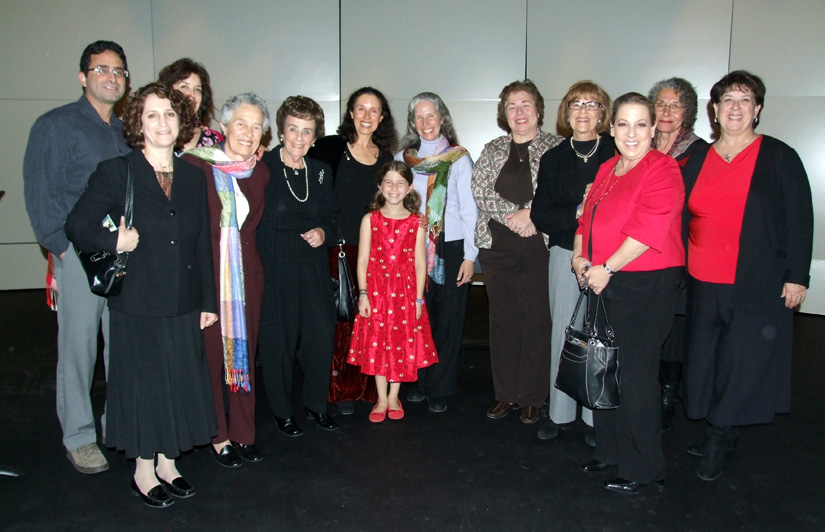
 LA JOLLA, California—Zina Schiff and her accompanist, Mary Barranger, were somewhere in the wings the evening of March 23 when Roselyn Pappelbaum, the director of the San Diego Jewish Music Festival, greeted the Garfield Theatre audience at the opening concert of the festival’s tenth season. I couldn’t see Zina, but it was easy to picture her.
LA JOLLA, California—Zina Schiff and her accompanist, Mary Barranger, were somewhere in the wings the evening of March 23 when Roselyn Pappelbaum, the director of the San Diego Jewish Music Festival, greeted the Garfield Theatre audience at the opening concert of the festival’s tenth season. I couldn’t see Zina, but it was easy to picture her.

